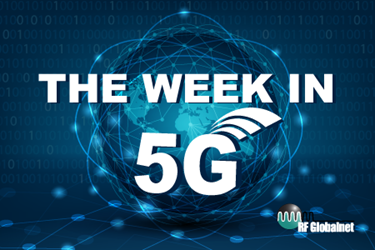The Week in 5G: 12/10/2019 — Netherlands' First Spectrum Auction this Summer; Global Body Sets 24 GHz Usage Standard
By Ed Biller

The Dutch government expects to carry out its first 5G spectrum auctions – covering the 700 MHz, 1,400 MHz, and 2,100 MHz bands – this June. The sale is expected to raise nearly $1 billion (US).
Each of the Netherlands’ top three telcos — KPN, Vodafone Ziggo, and T-Mobile Netherlands — is expected to participate in the auction, reports RCR Wireless, citing a statement by Dutch Secretary of State for Economic Affairs Mona Keijzer. Without naming names, the statement adds that equipment suppliers considered to be security risks could be banned from aiding in the nation’s 5G buildout.
Related, The European Union (EU) Council has warned member states that certain telecom equipment vendors may present a security risk and decreed that member states should take a "comprehensive and risk-based" approach to 5G security. While no direct correlation has been acknowledged, the warning followed a bout of US lobbying across the EU earlier this month; the US has a long-running feud with China’s Huawei and, increasingly, with ZHE.
"We were very pleased to see the conclusions on 5G that the EU council released," said Rob Strayer, the US State Department's deputy assistant secretary for cybersecurity, taking an apparent victory lap.
Indeed, according to one former FCC commissioner, overtaking China in the so-called race to 5G is “a national imperative.”
Reed Hundt, who led the FCC from 1993 to 1997, also told CNBC that two keys to the US gaining ground in 5G are dismissal of a federal lawsuit over the merger of T-Mobile and Sprint, and the release of more spectrum to the private sector – including spectrum currently reserved for military use.
Also in the US, the Department of Defense (The Army Contracting Command, specifically) has asked for industry input for four prototype proposals for wireless 5G technology testbeds at military bases. The first request, issued Dec. 2, covered Hill Air Force Base in Utah and the Marine Corps Logistics Base in Albany, Ga.
A second request issued Dec. 9 covers Joint Base Lewis-McChord in Washington state and the Naval Supply Systems Command's (NAVSUP) Fleet Logistics Center San Diego, according to a report by Federal Computer Week. The requests make good on a November announcement by DOD regarding its intent to begin testing and experimenting with 5G at four U.S. military bases.
In Japan, the ruling Liberal Democratic Party's tax system research commission recommended this week that the nation introduce tax incentives for companies that invest in 5G network infrastructure. The commission intends to include its proposal in the body’s tax revision outline for 2020, according to a report from Nikkei Asian Review.
Per the report, the incentives would span a three-year period, benefiting “licensed mobile phone companies and others who build wireless communication networks for areas such as those occupied by factories. Companies would get a 9 percent tax credit or 30 percent bonus depreciation for their 5G investments.”
In other regulatory news, in late November, the global body tasked with managing radio spectrum usage announced new emission limits 5G technology deployments, imposing a more stringent standard than that sought by the US Federal Communications Commission (FCC), but looser than that sought by the weather-forecasting community, reports Physics Today.
“Starting in 2020, telecom companies will be permitted to operate 24 GHz base stations that transmit radio signals to 5G-ready devices at an intensity limit of –33 decibel watts per 200 MHz; smartphones and other mobile stations can transmit at up to –29 dBW per 200 MHz,” the report states.
The NOAA projected its satellites would require a permissible range of –40 to –50 dBW per 200 MHz to continue collecting accurate data; the FCC wanted –20 dBW per 200 MHz. In May, NOAA acting administrator Neil Jacobs warned U.S. legislators that the FCC’s preferred level would decrease water vapor data collected by 77 percent, setting back weather forecast accuracy by 40 years.
In technology news, Singaporean-owned Australian telco Optus claims to have completed the world's first 5G data call using 2300 MHz spectrum. Per a ZDNet report, the trial “was completed in Sydney using kit from Ericsson, with the company touting that it is the only Australian telco with holdings in the 2300 MHz and 3500 MHz spectrum bands.”
